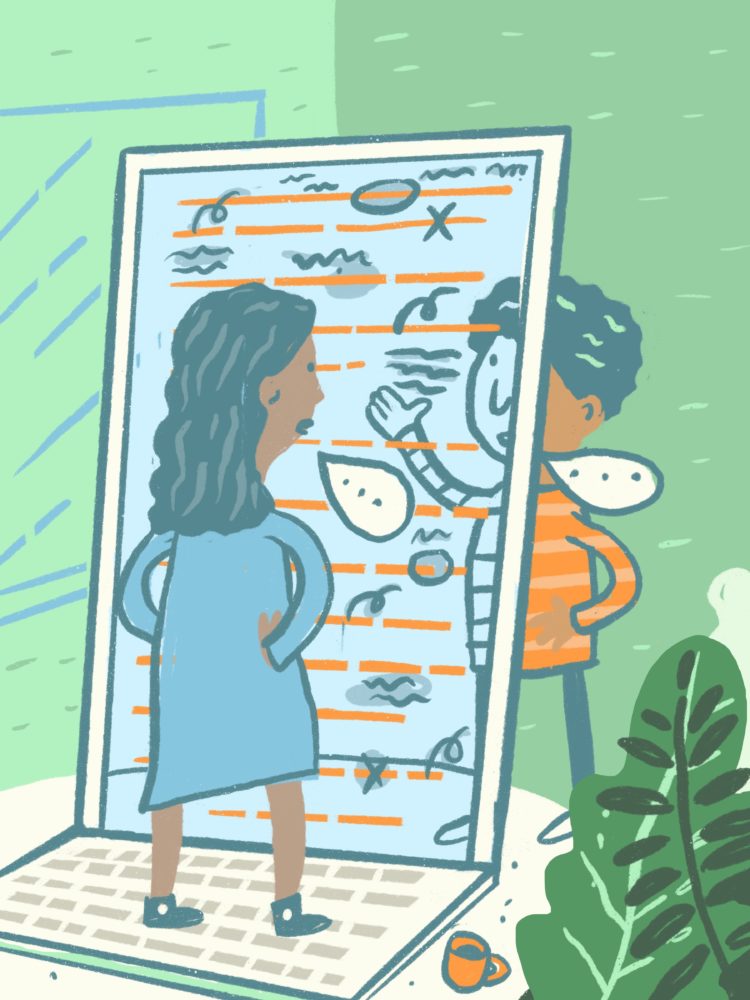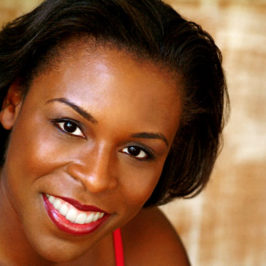Whether you’re a newbie writer, a seasoned author, or an all-around prolific genius like Nora Roberts, having a critique partner is paramount. Why? Most people aren’t able to view their own work objectively. A trustworthy critique partner can help a writer improve by offering an outside perspective. This includes providing support during times of self-doubt and holding that partner accountable with regard to deadlines. But the true value of a critique partner is that he or she will help you develop the tough skin that comes with receiving criticism gracefully—a skill that’s essential when submitting work for publication.

‘The relationship is yours to design…’ Illustration by Josh Quick
Since a critique partner is traditionally a fellow writer, the input may be less nuanced than an editor’s feedback but more craft-oriented than a beta read (i.e., test read) from a family member. That’s why choosing a critique partner is tricky. We want someone who will take the work as seriously as a paid professional would but who will also deliver that honest feedback with the compassion and encouragement of a friend.
I have three critique partners whom I met online. Each acts as a sounding board, telling me what works and what doesn’t. They dig into my manuscript, pull out the structural flaws, and propose corrective measures. Sometimes they suggest craft books to aid my understanding of characterization, setting, or grammar. Other times they provide links to short stories or novels to inspire creativity. Their feedback polishes my work and fosters my confidence.
You can find a good critique partner almost anywhere: your local coffee shop, the Writers Helping Writers Facebook group, the National Novel Writing Month forums, Critique.org, Romance and Mystery Writers of America, Wattpad, Goodreads, or any writing organization with a message board.
Better yet, look for a partner while taking a writing class. Select an affordable online class or visit your public library. Many branches have writer meetups and free in-house courses. Use the classroom setting to find someone with a similar level of experience—ideally, slightly above your own so you have room to reach beyond your current tier. If you’re unsure where to start, the coursework will create a foundation for the relationship by establishing a mutual understanding of what constitutes ‘good’ writing.
Whether you find your partner in person or online, consider a few additional guidelines for selection:
Look for a Partner Who Is Committed to the Craft
If you find yourself paired with someone who constantly wants validation, they probably aren’t going to look at your work with a critical eye. A critique partner shouldn’t simply stroke your ego or act as a yes-man. A good partner shares your vision but also gives constructive revision advice. The goal is to find someone who can help you overcome your weaknesses while bolstering your strengths. Choose a partner whose talents you respect and whose values you admire. This professionalism should resonate in all their interactions with you. If not, pause the relationship. Receiving feedback from someone who isn’t interested in doing the hard work doesn’t serve either party.
Search for Someone in the Same Field
This may seem trivial. After all, writing is writing, right? But remember, critique partnerships are about reciprocation, which makes this relationship more extensive than the one-sided interaction of a beta read. Initiate a feedback loop with someone who not only enjoys your style but who also understands your subject matter. This will prevent you from having to explain genre expectations to someone who is unfamiliar with them. For example, romance writers are expected to give their readers a happy ending but horror writers are not. A horror partner may argue that it is more poetic or realistic to have the heroine die at the end. Disagreements of this nature are an unnecessary headache. Keep the peace by selecting someone within your niche who understands the tropes of your trade.
Choose a Colleague with Shared Objectives
At the beginning of the partnership, keep submissions small. Send no more than twenty pages. Use these shorter passages as an opportunity to establish a mutual working style and define a common goal even if it is as simple as conquering run-on sentences. This will focus the critiques and establish a starting point for growth. Ask your partner about their habits and expectations. Perhaps you’re both working toward a specific task like self-publishing or drafting your first agent query. Whatever the goal, make sure you and your partner have discussed those ideas before committing to a long-term relationship. Outlining your objectives ahead of time will allow you to push each other, and you’ll accomplish more.
Select Someone Responsible
Establish rules for delivering feedback. Agree to be honest with your critiques but also let your partners know what topics are off limits. If your story contains a scientific element you’d rather leave for an expert’s review, make sure to let your partner know that upfront to avoid wasting each other’s time. Furthermore, agree on a turnaround time and commit to that deadline. A common work ethic is key. Will you exchange pages weekly? Monthly? Chapter to chapter or project to project? The relationship is yours to design. But if you or your partner can’t deliver within the agreed upon period, the relationship is not worth cultivating. Nothing is worse than someone who doesn’t follow through.
As you move forward with these strategies keep in mind that finding a critique partner requires effort. Like dating, you may go through several relationships before finding the perfect one. As you start your journey, think about your ideal partner and create a list of do’s, don’ts, and compromises. Realize that no one is perfect so the list may bend and flex as you move closer to finding a partnership that works. The important thing to remember is that the relationship must start with trust, honesty, mutual respect, and professionalism in order for you both to grow.
